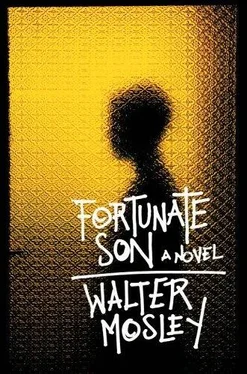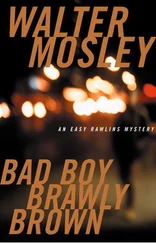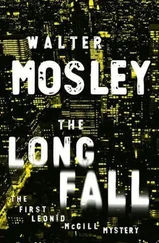“But we were raised together and we understand each other. He used to protect me when the big kids would pick on me, and I explain things to him.”
“But he has three years of college and you don’t have hardly any school. What do you explain to him? The street?”
Over the previous day and a half the three had changed trains twice and told their stories. Clea’s father was a baker in Denver, and her mother was a part-time nurse in the pediatric ward of the university’s teaching hospital. Clea was their fourth child. Her two brothers were high school dropouts, and her sister was a schizophrenic who lived on the street half the time and spent the rest of her life in various mental hospitals. Clea was the hope of her family, and she intended to make something of herself.
Thomas had told her about everything he’d done and about the police being after him. He didn’t think that she would tell anyone, and Eric was asleep by then.
“I can see things in other things,” Thomas said. “Eric’s real smart, but he doesn’t pay attention to everyday things like I do.”
“Like what?”
“Rocks and eyes and making things up.”
He chose that moment to take her hand.
“Your skin is so rough,” she said.
He pulled away, but she reached out and drew the hand back.
“I thought that you were making it up about living in the street,” she said. “But your hands are like a workingman’s hands.”
“I knew a woman that was schizo,” Thomas said. “She saw things too. There was a guy named Benny who would say that she was his ho, an’ he would get money from other homeless guys to have sex with her.”
“And did you have sex with her?”
“No. But I’d go sit with her sometimes, and if I was really quiet she’d get still and tell me about the things she saw.”
“Like what?”
“There was a big man who sometimes chased her and sometimes killed her, but then he could be nice and take her on his shoulders and show her the sea. It was a light-blue-and-pink ocean with fish that swam on top of the water and talked to the men in boats who sailed out there with them. And the moon was very close to the earth, and there wasn’t any cigarettes or alcohol.”
“She was crazy.”
“Maybe. But I can tell you what she said and you don’t call me crazy.”
“What was the woman’s name?” Clea asked.
“Lana.”
“Did you get Lana away from Benny?”
“No. She liked him and called him her husband.”
“But he was pimpin’ her.”
“Yeah, but she said that he never let those men hurt her.”
“That’s crazy. He took those men there in the first place,” Clea said.
“Life’s crazy,” Thomas replied. “When Benny would get money for Lana, he’d go out and buy us all pizza and a quart of root beer.”
“So you lived off her too?”
“I only stayed near them for about a week. And I don’t eat cheese or drink sodas. They make me sick.”
Thomas couldn’t have explained why he kissed Clea then. She didn’t know why she let him.
Clea had her whole life planned out. She would go to college and get her degree and then work at the UN translating French, Portuguese, Italian, and other languages for the sub-Saharan African nations. She would find a young black man who was either a doctor or a lawyer and marry him and move to Montclair, New Jersey, where she would relocate her parents and her sister. Her lazy brothers could fend for themselves.
But there they were kissing passionately in the early hours, in that hurtling train. Eric awoke once and saw them. Clea had her hand on Thomas’s while he kissed her neck again and again.
It was then that Eric thought about what his brother had said about the moon and tides. The Golden Boy, Eric, closed his eyes and muffled a sigh — his brother had somehow delivered him from his fear.
Eighteen hours later the train pulled into Penn Station. The boys put Clea into a yellow taxi, and she gave them her cell number.
“Call me if you want to come down and see NYU,” she’d said.
The boys met a nun collecting money for homeless children and asked her if there was an inexpensive place they could stay. She told them about a place uptown, and Eric put a twenty dollar bill in her jar.
That night Eric Tanner Nolan and Thomas “Lucky” Beerman were ensconced in the men’s residence at the 92nd Street YM&YWHA.
After the first few days of exploring together, the brothers started going out separately. Thomas discovered Central Park while Eric plumbed Lower Manhattan.
For the next three weeks they explored the city. Eric liked the big buildings and the Wall Street crowd. Down among the businessmen and — women he took tours, listened and learned firsthand about how the market was run. He made impromptu appointments with personnel officers, introducing himself as a UCLA senior who was looking for student programs in the stock market. He met a female stockbroker on a tour of Morgan Stanley. Her name was Constance Baker. After a fifteen-minute conversation, she took Eric under her wing.
He had told her pretty much the truth about his coming to New York. After a long separation he and his brother had come east on a holiday to have fun and get to know each other again. They were staying at the Y.
Constance was thirty-six, handsome, and in charge. She had a boyfriend named Jim Harris, who worked commodities and lived in a big house in Brooklyn. Constance had an apartment that overlooked the Hudson River in the West Village, where she slept during the week. On the weekends she stayed with Jim at his house in Brooklyn Heights.
Meanwhile, each day Thomas would walk south on Lexington until he got to 59th Street, and then he’d head west until he got to the southernmost side of the park. It was early April, and the cherry trees were filled with the white and pink blossoms of spring. There were vast lawns and horses and thousands of people wandering in the light of morning. He’d walk up the asphalt pathways each day until he got to the Metropolitan Museum of Art. Once there he’d give what money he had and then spend hours among the paintings, sculptures, and jewelry of the ages.
He walked from ancient Rome and Greece into Africa and South America. He sat for hours one day among the wooden boats of the cannibals of the South Sea Islands. He imagined himself in the cramped canoes carved from whole trees, traveling under canopies of green along rivers and then out on the cobalt sea.
He spent five days in a row surrounded by the arts of China, India, and Japan. This section of the museum didn’t have many visitors, and often Thomas found himself alone, sitting on a courtesy bench in front of a great stone Buddha or in a re-created shogun’s home.
Thomas loved the stillness of the paintings. He imagined that this was what his grandmother Madeline saw when she was looking at the television, but the sound and action of the TV was too much for him; just the frozen moment of men and women in motion was enough to imagine a whole world of action and life.
His favorite tableau was a doorway to the left of the entrance of the museum. It looked upon a re-created room from Pompeii. There were rose-painted walls drawn upon with pedestrian scenes and still lifes, intricately tiled floors, and a slender stone bed behind which there was the image of a window. Thomas imagined looking down from that window on the people in the street below: men in togas and women in blues and reds with no electricity or cars, no airplanes, televisions, or telephones. People like him, lopsided and broken from just living, happy among one another, next to a sea that, Eric said, was as blue as a blue crayon.
Sometimes he would have silent dialogues with his mother or Alicia while meandering through the halls of art. But not so much as before, when he was on the streets of Los Angeles. Often he found himself thinking about the afternoons when he would take the subway downtown to Washington Square Park, where every other day or so he would meet Clea Frank for coffee.
Читать дальше












